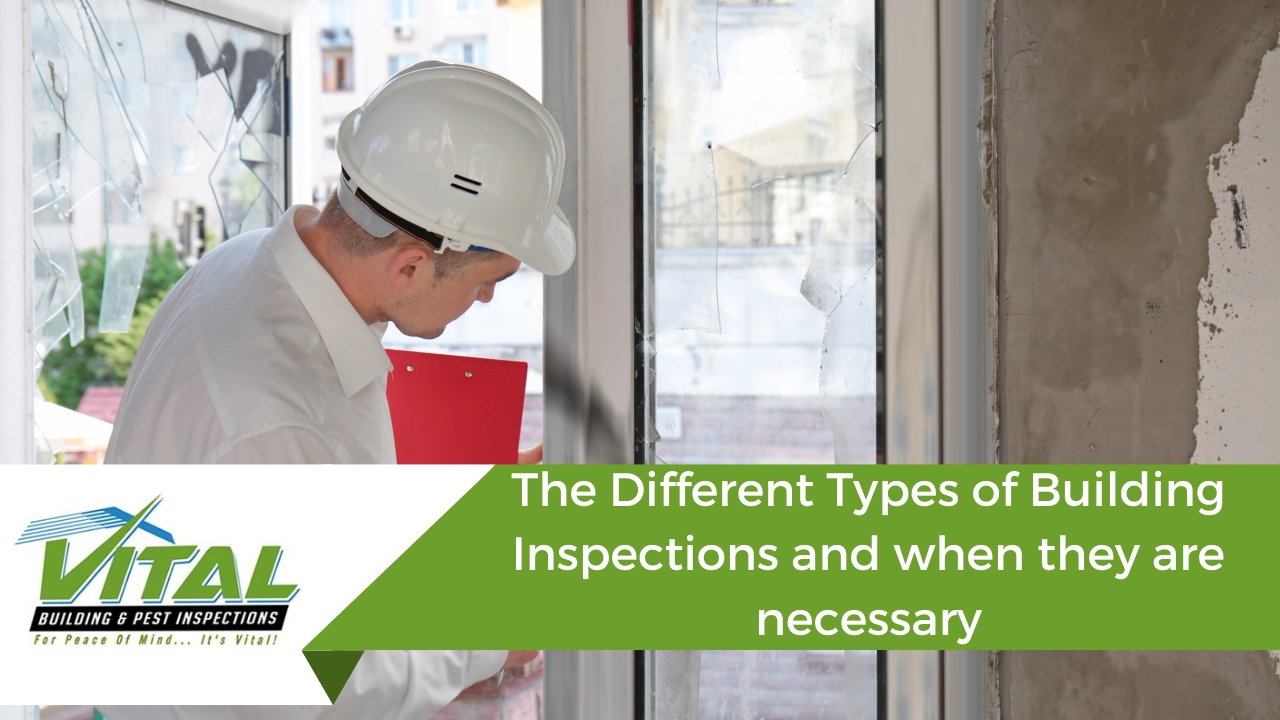Regular building inspections are essential for maintaining the safety and integrity of any property. Whether you’re a homeowner looking to protect your investment, a business owner ensuring the safety of your employees and customers, or a real estate professional looking to assess the condition of a potential purchase, understanding the different types of building inspections and when they are necessary can help you make informed decisions about your property.
From structural inspections to electrical and plumbing checks, environmental assessments to specialised inspections, there are a variety of inspection types that can help you identify and address any potential issues with your building.
An overview of building inspection types
Building inspections are conducted to assess the condition and safety of a property. There are many different types of building inspections that can be performed, depending on the specific needs and concerns of the property owner or prospective buyer. Some common types of building inspections include:

- Pre-purchase inspections: These inspections are conducted before a property is purchased to assess its condition and identify any potential issues that may need to be addressed. Pre-purchase inspections can help buyers make informed decisions about whether to proceed with a purchase and can also provide a list of repairs or renovations that may need to be made.
- Structural inspections: Structural inspections are conducted to assess the overall condition and stability of a building’s structure, including the foundation, walls, floors, and roof. These inspections can help identify any issues that may affect the safety or integrity of the building.
- Electrical and plumbing inspections: These inspections are focused on the building’s electrical and plumbing systems, respectively. They can help identify any issues with wiring, outlets, and appliances, as well as identify any problems with pipes, fixtures, and plumbing installations.
- Environmental inspections: Environmental inspections assess the impact of the building on the surrounding environment and can include inspections for things like asbestos, lead paint, mould and radon gas.
- Specialised inspections: Specialised inspections are tailored to the specific needs and concerns of the property owner or buyer. These can include inspections for things like pools, spas, sprinkler systems, and fireplaces, as well as inspections for specific types of properties, such as commercial buildings or multi-family dwelling
The importance of regular building inspections
Regular building inspections are crucial for maintaining the safety and integrity of any property. They can help identify and address any potential issues before they become more serious and costly to repair. Some benefits of regular building inspections include:
- Early identification of problems: Building inspections can help identify issues that may not be immediately noticeable to the naked eye. By catching problems early, regular inspections can help prevent more serious issues from developing and can often save property owners money in the long run.
- Improved safety: Building inspections help ensure that a property is safe for its occupants and visitors. Regular inspections can identify potential safety hazards such as structural issues, electrical problems, or environmental hazards, and help property owners address these issues before they become more serious.
- Increased property value: Regular building inspections can help maintain the value of a property. By identifying and addressing any potential issues, inspections can help prevent a property’s value from decreasing over time.
- Compliance with regulations: In some cases, building inspections may be required by law or regulations to ensure that a property meets certain safety standards. By conducting regular inspections, property owners can ensure that they are following these regulations.

Pre-purchase building inspections: why they matter
Pre-purchase building inspections, also known as home inspections or property inspections, are conducted before a property is purchased to assess its condition and identify any potential issues that may need to be addressed. These inspections are typically conducted by a professional building inspector and can help buyers make informed decisions about whether to proceed with a purchase and can also provide a list of repairs or renovations that may need to be made.
There are several reasons why pre-purchase building inspections are important:
- Unforeseen issues: Pre-purchase inspections can help identify any issues with the property that may not be immediately noticeable to the naked eye. These can include structural problems, electrical issues, plumbing problems, or environmental hazards. By conducting a pre-purchase inspection, buyers can get a better understanding of the condition of the property and any potential issues that may need to be addressed.
- Negotiating power: Pre-purchase inspections can provide buyers with valuable information that can be used during negotiations with the seller. If the inspection identifies any issues with the property, buyers can use this information to negotiate a lower price or request that the seller address the issues before the sale is finalised.
- Peace of mind: Pre-purchase inspections can provide buyers with peace of mind by giving them a better understanding of the condition of the property and any potential issues that may need to be addressed. This can help buyers feel more confident about their purchase and avoid any unpleasant surprises.
Structural inspections: keeping your building safe
Structural inspections are conducted to assess the overall condition and stability of a building’s structure, including the foundation, walls, floors, and roof. These inspections are typically conducted by a professional building inspector and can help identify any issues that may affect the safety or integrity of the building.
There are several reasons why structural inspections are important:
- Safety: Structural inspections are essential for ensuring the safety of a building and its occupants. By identifying any structural issues, such as foundation cracks or roof damage, inspections can help prevent accidents or injuries caused by structural failures.
- Integrity: Structural inspections can help identify any issues that may compromise the integrity of a building. This can include things like water damage, rot, or termite infestations, which can weaken the structure of a building over time. By identifying and addressing these issues, structural inspections can help preserve the integrity of a building.
- Maintenance: Structural inspections can also help property owners identify any maintenance issues that may need to be addressed to maintain the safety and integrity of a building. This can include things like replacing worn or damaged materials or making repairs to foundation cracks or roof leaks.
Electrical and plumbing inspections: essential for any building
Electrical and plumbing inspections are focused on the building’s electrical and plumbing systems, respectively. These inspections are typically conducted by a professional building inspector and can help identify any issues with wiring, outlets, and appliances, as well as any problems with pipes, fixtures, and plumbing installations.
There are several reasons why electrical and plumbing inspections are important:

- Safety: Electrical and plumbing systems are essential for the safety of a building and its occupants. Electrical inspections can help identify any issues with wiring or outlets that may pose a fire hazard, while plumbing inspections can help identify any issues with pipes or fixtures that may cause water damage or leaks.
- Functionality: Electrical and plumbing inspections can also help ensure that these systems are functioning properly. This can include things like making sure that outlets and switches are working properly, or that plumbing fixtures are not leaking.
- Maintenance: Electrical and plumbing inspections can also help property owners identify any maintenance issues that may need to be addressed in order to maintain the functionality and efficiency of these systems. This can include things like replacing worn or damaged materials, or making repairs to faulty wiring or plumbing fixtures.
Environmental inspections: protecting your property and the community
Environmental inspections assess the impact of a building on the surrounding environment and can include inspections for things like asbestos, methamphetamine contamination, lead paint, mould, and radon gas. These inspections are typically conducted by a professional building inspector and can help property owners identify and address any potential environmental hazards that may be present on their property.
There are several reasons why environmental inspections are important:
- Safety: Environmental inspections can help identify any hazards that may pose a risk to the health and safety of a building’s occupants or the surrounding community. For example, asbestos, methamphetamine and lead paint can cause serious health issues if inhaled, while mould and radon gas can also pose risks to human health.
- Compliance with regulations: In some cases, environmental inspections may be required by law or regulations in order to ensure that a property meets certain safety standards. By conducting these inspections, property owners can ensure that they are in compliance with these regulations and avoid any potential fines or legal issues.
- Preserving the environment: Environmental inspections can also help property owners identify any issues that may have an impact on the surrounding environment. For example, inspections for things like septic systems or oil tanks can help identify any potential issues that may affect the local water supply or soil.
When to schedule a building inspection
There are several situations in which it may be necessary to schedule a building inspection:
- Pre-purchase inspections: As mentioned earlier, pre-purchase inspections are typically conducted before a property is purchased in order to assess its condition and identify any potential issues that may need to be addressed.
- Regular maintenance: It is a good idea to schedule regular building inspections as part of a maintenance plan for a property, usually annually. This can help identify and address any potential issues before they become more serious and costly to repair.
- Renovations or remodelling: If you are planning to make any renovations or remodelling to a property, it may be a good idea to schedule a building inspection beforehand to identify any potential issues that may need to be addressed before the work is done.
- Changes to the property: If you are making any significant changes to a property, such as adding an addition or converting a space, it may be necessary to schedule a building inspection to ensure that the changes meet all necessary building codes and regulations.
- Before listing a property for sale: If you are planning to sell a property, it may be a good idea to schedule a building inspection before listing it for sale. This can help identify any potential issues that may need to be addressed and can also provide a list of repairs or renovations that may be necessary.
Building inspections are an important part of maintaining the safety, integrity, and value of a property. By understanding when to schedule an inspection, property owners can ensure that their property is in good condition and address any potential issues in a timely manner.
The benefits of working with a professional inspection company like Vital Building Inspections Sydney
There are several benefits to working with a professional inspection company:
- Expertise: Professional inspection companies employ trained and experienced building inspectors who have the knowledge and expertise to accurately assess the condition of a property. They can identify issues that may not be immediately noticeable to the naked eye and provide detailed reports on their findings.
- Objectivity: Professional inspectors are objective and unbiased, which can be especially important when conducting pre-purchase inspections. They are not affiliated with the seller or the buyer, which means they can provide an unbiased assessment of the property’s condition.
- Comprehensive inspections: Professional inspection companies can conduct a wide range of inspections, including structural inspections, electrical and plumbing inspections, environmental assessments, and specialised inspections. By working with a professional inspection company, property owners can be sure that all necessary inspections are conducted and that any potential issues are identified.
- Time and convenience: Professional inspection companies can save property owners time and hassle by conducting inspections and preparing detailed reports. This can be especially useful for busy homeowners or real estate professionals who may not have the time or expertise to conduct inspections themselves.
A professional inspection company, such as Vital Building Inspections Sydney will provide a number of benefits, including expertise, objectivity, comprehensive inspections, and time and convenience. By entrusting the inspection process to professionals, property owners can be confident that they are receiving accurate and reliable information about the condition of their property.

Trust the experts to keep your property in top condition
At Vital Building Inspections Sydney, we understand the importance of regular building inspections for maintaining the safety and integrity of any property. That’s why we offer a wide range of inspection services, including pre-purchase inspections, structural inspections, electrical and plumbing inspections, environmental assessments, and specialised inspections. Our team of experienced and trained building inspectors is committed to providing accurate and reliable information about the condition of your property. We understand the value of your investment and are dedicated to helping you make informed decisions about your property. Contact us today on 0401 012 074 to learn more about how we can help you protect your investment and ensure the safety and functionality of your building.






